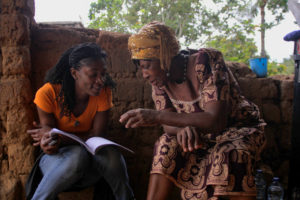
“I started to just write a portrait of my mother because I was missing her,” Mbakam says. “I started to just write all the conversations that I wanted to have with my mother, all the questions that I wanted to ask her. And that’s how the project grew and became the film that it is today.”
In Cameroon’s Bamiléké culture, a woman gives birth to her child surrounded by the entire family. The following days are filled with post-birth customs and traditions.
The result, The Two Faces of a Bamiléké Woman, is a documentary chronicling Mbakam’s return to Cameroon for the first time in seven years, since she first left to study film in Belgium in 2007. Coming back as a wife and mother, she engages the women in her family and her community of the Bamiléké ethnic group in conversations about their rituals and experiences. The two faces in the title, she explains, represent their two generations — what they share, how they differ and what they can still learn from one another.
In one scene of The Two Faces of a Bamiléké Woman, Mbakam’s mother and aunt reflect on their marriages: having a husband who took multiple wives, being forced to get married at 14, feeling afraid and uncertain of their futures.
“I was surprised to hear that because I always saw my mother and her sister just be happy,” Mbakam says. “I didn’t know that behind that happiness there were some scars.”
She does not criticize or look down on these customs — she inquires and then gives the women space to share their perspectives. She explains that this dynamic is important to her as an African filmmaker because it asks the audience to shift their gaze and identify with her mother and the other Bamiléké women in the film. After growing up without ever seeing herself or her story in mainstream media, Mbakam finds power in switching gears and providing on-screen representation that is for Africans, by Africans.
“My intention as a Cameroonian filmmaker is to decolonize myself from what I have learned from film and from what I have seen,” she says. “African cinema is colonized by other forms of cinema. It is important for me to free myself from all this to find a form that is fair to the people I film.”
Source : npr